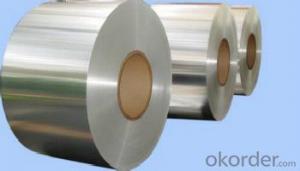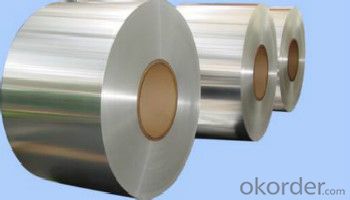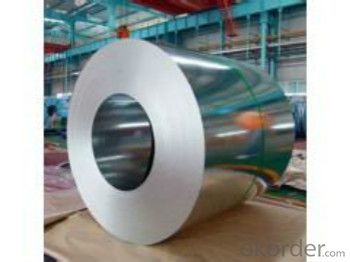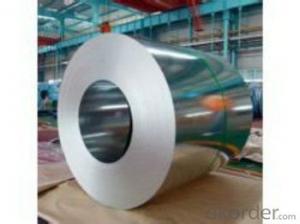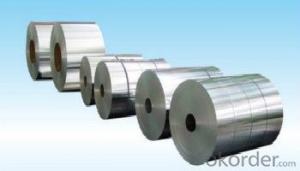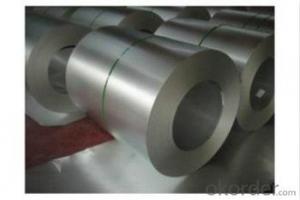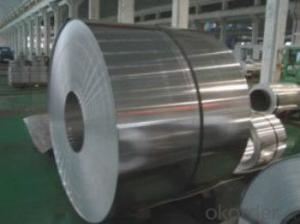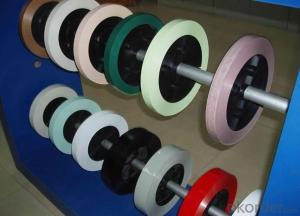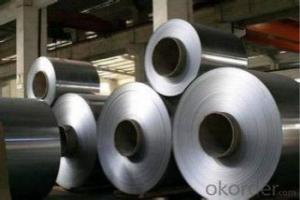Mill Finished Aluminum Coil AA3105 Temper H24 - Coil of Aluminum 6 Wide
- Loading Port:
- Shanghai
- Payment Terms:
- TT or LC
- Min Order Qty:
- 3 m.t.
- Supply Capability:
- 4000 m.t./month
OKorder Service Pledge
OKorder Financial Service
You Might Also Like
Specification
1. Aluminum Coil Description:
Aluminum coil, is a rolled product, produced in a coiled form of continuous strip, and having an ID (Inner diameter) and OD (Outer diameter).Common alloy coil are used for a wide variety of applications, alloy 1050, 1060, 3003, 3105, 3005, 5052, 5754, 5083, 6061, 8011, 8021, and so on, in thickness from 0.0065-7mm, in width from 300- 2200mm.
Aluminium coil can be deep processed into aluminium foilstock, aluminium circle, aluminium coating products, aluminium ceiling, aluminium plastic composite panel (APCP), aluminium embossed products, etc.
2.Main Features of the Aluminum Coil:
• Great ductility
• Heat conductivity
• Anti-corrosion
• Moisture resistanve
3.Aluminum Coil Images
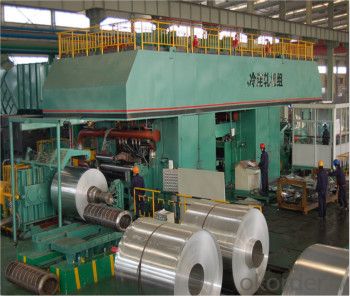
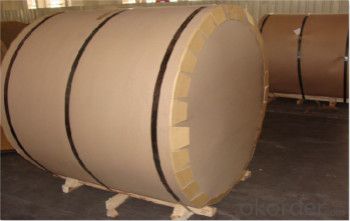
4.Aluminum Coil Specification
Aluminum Coil/Sheet | |
Main Specification | |
Alloy | AA1xxx (AA1050, AA1060, AA1070, AA1100 etc.) |
AA3xxx (AA3003, AA3004, AA3005, AA3105 etc.) | |
AA5xxx, AA6XXX (AA5052,AA5083, AA5754, AA6061, AA6062 etc.) | |
AA8xxx(AA8011, AA8006, AA8079 etc.) | |
Temper | H14,H16, H18, H22, H24, H26, H32,O/F |
Thickmess | ≥0.2mm |
Width | 30mm-2100mm |
Standard | GB/T 3880-2006 |
Special specification is available on customer's requirement | |
5.FAQ
We have organized several common questions for our clients,may help you sincerely:
(1) How to guarantee the quality of the products?
We have established the international advanced quality management system, every link from raw material to final product. we have strict quality test; we resolutely put an end to unqualified products flowing into the market. At the same time, we will provide necessary follow-up service assurance.
(2) MOQ?
For trail order, we accept 3 MT.
(3) Payment term?
30% deposit, balance against the BL copy; 100% L/C at sight
(4) What is the delivery time?
Depends on actual order, around 30 to 35 days
- Q: What are the properties of aluminum coils?
- Aluminum coils possess several key properties that make them highly sought after in various industries. Firstly, aluminum coils have a high strength-to-weight ratio, meaning they are lightweight yet durable. This characteristic makes them ideal for applications where weight reduction is crucial, such as in the aerospace industry. Additionally, aluminum coils exhibit excellent corrosion resistance. The formation of a thin, protective oxide layer on the surface of the metal helps prevent further oxidation, making them suitable for outdoor and marine environments. This corrosion resistance also translates to a longer lifespan, reducing maintenance requirements and costs. Another important property of aluminum coils is their high thermal conductivity. This feature allows for efficient heat transfer and makes them well-suited for applications in the heating, ventilation, and air conditioning (HVAC) industry. Furthermore, aluminum coils have excellent electrical conductivity, making them favorable for use in electrical and electronic components. Aluminum coils are also highly malleable and ductile, allowing for easy shaping and forming. This versatility makes them a popular choice in manufacturing processes, such as in the production of automobile parts, cans, and packaging materials. Lastly, aluminum coils are known for their recyclability. They can be easily melted down and reused without compromising their quality, making them an environmentally friendly choice. This recyclability aspect aligns with the increasing focus on sustainability and reducing the environmental impact of various industries. In summary, aluminum coils possess properties such as high strength-to-weight ratio, corrosion resistance, thermal and electrical conductivity, malleability, and recyclability. These properties make them valuable in numerous applications across various industries.
- Q: Are aluminum coils suitable for architectural roofing systems?
- Yes, aluminum coils are suitable for architectural roofing systems. Aluminum is a popular choice for roofing due to its numerous advantages. Firstly, aluminum is lightweight, which makes it easier to handle during installation and reduces the load on the building's structure. Additionally, aluminum is highly durable and corrosion-resistant, making it a long-lasting option for architectural roofing systems. It also has excellent thermal properties, reflecting heat and reducing energy consumption. Moreover, aluminum coils can be easily shaped and formed into various profiles and designs, allowing for flexibility in architectural styles. Lastly, aluminum is a sustainable material as it is recyclable, making it an environmentally friendly choice for roofing systems. Overall, aluminum coils are a suitable and practical option for architectural roofing systems, providing durability, versatility, and energy efficiency.
- Q: Its got probably 330 horses right now with aluminum heads what do you think it be approx.
- The material is not what establishes the performance. It is the shape, design, and volume of air flow through the ports. Editorial: If this persuit is all about the hobby--- have fun. Don't expect to make your money back on this car if you ever sell it though. In fact such modifications may reduce resale value. Editorial ended. Aluminum is easier to machine than cast iron and this is the biggest reason you find some high-performance heads in aluminum. A completely special designed part can be more easily machined, even from solid aluminum billet. Cast iron usually requires compromise in terms of being able to actually cast the raw part itself with roughed out shape in the sand mold. Even then if aluminum is sand-cast it is still easier to machine and clean up-- especially for low volume production. So you see many high-perf heads are aluminum. Its not the aluminum that does the job--- it is the design itself. Aluminum has better thermal conductivity for cooling, but that is not always an advantage when matching up to a cast iron block. It is a side consideration-- the shape of the combustion chamber and valve position and ports is what gets it done. Some engine makes have very good cast-iron performance heads that are factory proven and usually less trouble (like leaking head gaskets and all) than similar aluminum heads. Depending upon the make of engine you are working with, there are books, parts lists, and so on for various build-ups for performance. They list part numbers, advantages and disadvantages and so forth. Do a search on-line and it will be worth it to have the reference in hand. Summit Racing might be one place to start. If you have a particular part in mind, you can find the original specs from the manufacturer with some guidance to compare to their other parts and what are the advantages-disadvantages.
- Q: How do aluminum coils compare to magnesium coils in terms of strength?
- In comparison to magnesium coils, aluminum coils typically exhibit greater strength. Aluminum is renowned for its exceptional strength-to-weight ratio, thus rendering it a favored option across multiple industries. It boasts a higher tensile strength and superior resistance to deformation when subjected to stress, unlike magnesium. Moreover, aluminum possesses a higher yield strength, enabling it to withstand more substantial loads before succumbing to permanent deformation. Conversely, magnesium, despite its lighter nature, tends to possess inferior strength attributes. Although magnesium coils may prove beneficial in specific scenarios where weight plays a crucial role, aluminum coils are generally favored for their strength and longevity.
- Q: How are aluminum coils inspected for quality?
- Aluminum coils are inspected for quality through various methods such as visual examination, dimensional measurements, and non-destructive testing techniques. These inspections involve scrutinizing the surface of the coil for any defects, ensuring it meets the specified dimensions, and conducting tests like ultrasonic or eddy current testing to detect any internal flaws or discontinuities. These rigorous inspections help ensure that the aluminum coils meet the required standards and are of high quality.
- Q: Can aluminum coils withstand high temperatures?
- Yes, aluminum coils can withstand high temperatures. Aluminum has a high melting point of 660 degrees Celsius (1220 degrees Fahrenheit), making it suitable for applications where high temperatures are involved.
- Q: Can aluminum coils be used in the production of heat exchangers?
- Indeed, the utilization of aluminum coils in the fabrication of heat exchangers is feasible. Aluminum has gained significant popularity as a preferred material for heat exchangers owing to its exceptional thermal conductivity, which facilitates effective heat transfer. Moreover, its lightweight nature and resistance to corrosion render it a durable and enduring choice for heat exchanger implementations. The incorporation of aluminum coils in heat exchangers is widespread across diverse sectors such as HVAC, refrigeration, automotive, and aerospace.
- Q: What are the common surface finishes for aluminum coils in the automotive industry?
- The common surface finishes for aluminum coils in the automotive industry include mill finish, painted finish, anodized finish, and laminated finish.
- Q: wikipedia says welding aluminum by means of stick welding is possible but i have always been told TIG is the only way to weld aluminum. what do i need in order to stick weld aluminum? BTW i have a Lincoln Electric AC 225 Stick Welder
- Aluminum Stick Welding
- Q: Can aluminum coils be used in corrosive environments?
- Yes, aluminum coils can be used in corrosive environments. Aluminum is known for its excellent corrosion resistance due to the formation of a protective oxide layer on its surface. This oxide layer acts as a barrier, preventing further corrosion from occurring. Additionally, aluminum coils are often coated with a protective layer or treated with special coatings to enhance their resistance to corrosive environments further. However, it is essential to consider the specific corrosive environment and consult with experts to ensure that the chosen aluminum coil and protective measures are suitable for the specific conditions in which they will be used.
Send your message to us
Mill Finished Aluminum Coil AA3105 Temper H24 - Coil of Aluminum 6 Wide
- Loading Port:
- Shanghai
- Payment Terms:
- TT or LC
- Min Order Qty:
- 3 m.t.
- Supply Capability:
- 4000 m.t./month
OKorder Service Pledge
OKorder Financial Service
Similar products
Hot products
Hot Searches
Related keywords
